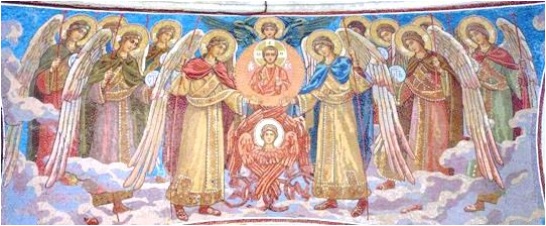by Rev. Antony W. Ball

.
You know that Christmas carol, of course? No…? Oh – perhaps you know it as…
Hark! The herald angels sing ‘Glory to the new-born King’
They’re two different versions of the same carol. Charles Wesley wrote it in 1739, and was apparently not too keen on it – he left it out of his collection of eighteen Hymns for the Nativity of Our Lord published in 1745 – but within a few years George Whitefield had re-written the first line into its now-familiar form and it ‘caught on’ and became a firm favourite. Carols and hymns are still being revised and updated, of course – in some hymnbooks many ‘thee’s and Thou’s have become ‘you’s and the URC’s hymnbook Rejoice and Sing uses ‘inclusive language’ so that, for example, in the second verse of ‘Hark the herald’, “pleased as man with men to dwell” has become “pleased as man with us to dwell”. Like people, hymns and carols change over time.
People who are not regular church-goers do often make a ‘special effort’ at some point during the Christmas season – either on Christmas Day itself (a Sunday this year) or, even more likely, they’ll come to a Carol Service and join in the singing of hauntingly familiar carols which they had either learned at school or somehow just ‘picked up along the way’. But why do they come? Over the years we’ve often heard comments like “Well, Christmas just wouldn’t seem the same, somehow, without singing a few carols” – so nostalgia is one reason. Another reason may be something akin to embarrassment, or even guilt – they feel that they should be attending Church more often, but something else always seems to get in the way – and Christmas (or Easter) spurs them on to make that ‘special effort’.
Whatever their reason, we try to make them as welcome as we can, without even questioning let alone judging their motives, but it still seems sad that they’re missing out on a vital part of what Church can offer them. In our sort of Church we often use the word ‘fellowship’ – almost as an alternative to the word ‘Church’. It means ‘friendship’, of course, but far more than that.
When I retired, in 2014, from being Pastor of our Church, I remained a Church Member but was, very sensibly, asked to absent myself from our Church for six weeks in order to ‘make a clean break’ and to give the Church a chance to acclimatise to carrying on without me. During those six weeks I went to a dozen or more different churches and was warmly welcomed to worship services in the vast majority of them – there was friendship in abundance, but not fellowship. What was missing was that indescribable sense of being part of a Church fellowship rather than just visiting and joining in worship. Nowadays I go to a service of Morning Prayer at an Anglican Church almost every weekday, and am most warmly welcomed there, and I even lead the service on the vicar’s ‘days off’, but it’s still not “my Church”.
So let’s warmly welcome anybody and everybody who may come to worship with us during this Advent and Christmastide, but let’s also remember there’s a difference between attending a church for worship and being part of a Fellowship.
.
* According to my dictionary, the word ‘welkin’ means either “a cloud” or “the upper atmosphere, the region of the air in which clouds float, birds fly etc.” or “the apparent arch or vault of heaven overhead, the sky, the firmament.” It was not a particularly ‘religious’ word in the 18th century.